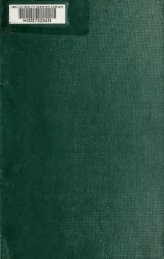12 <strong>The</strong> <strong>Health</strong> Bulletin July, 1951th<strong>at</strong> it might serve as a reminder to succeedinggener<strong>at</strong>ions <strong>of</strong> students hereth<strong>at</strong>, thorugh the efforts <strong>of</strong> such men,has come the gre<strong>at</strong>ness <strong>of</strong> Carohna."When he retired last year. Time Magazinehonored Dr. MacNider by describinghim as one <strong>of</strong> the world's top authoritieson diseases <strong>of</strong> the kidney andthe effects <strong>of</strong> age and injury on celltissue. At a testimonial dinner, lastJune, in his honor. Dr. Alfred N. Richards,<strong>of</strong> Philadelphia, said <strong>of</strong> Dr. Mac-Nider's work th<strong>at</strong> it was known theworld over for the light it has thrownon the action <strong>of</strong> various therapeutic andtoxic agents, such as uranium, chlor<strong>of</strong>ormand mercury. <strong>The</strong> speaker continued:"No one <strong>of</strong> his friends thinks <strong>of</strong>Dr. MacNider simply as an inspired teacherand faithful investig<strong>at</strong>or. <strong>The</strong>yadmire him for these reasons; they revereand love him for other qualitiessimplicity, truthfulness, humerous understanding<strong>of</strong> the foibles, as well as thevirtues, <strong>of</strong> human beings—his own included.He has a genius for friendship."<strong>The</strong> facts upon which this article isbuilt were taken from biographies appearingin the St<strong>at</strong>e press, followingDr. MacNider's de<strong>at</strong>h. <strong>The</strong> l<strong>at</strong>e EdwardKidder Graham, while he was President<strong>of</strong> the <strong>University</strong> <strong>of</strong> <strong>North</strong> <strong>Carolina</strong>,once made the st<strong>at</strong>ement to members<strong>of</strong> the press <strong>at</strong>tending a reception <strong>at</strong> theExecutive Mansion, in Raleigh, th<strong>at</strong> thebest and most understandable Englishin the world is found in the columns <strong>of</strong>our newspapers. It also might be st<strong>at</strong>edth<strong>at</strong> the newspapers <strong>of</strong> today, with theircurrent facts and figures, will becomethe history <strong>of</strong> tomorrow, to which studentswill resort for inform<strong>at</strong>ion concerningthe age in which we are living.His Work WiU LiveDr. MacNider's accomplishments inthe field <strong>of</strong> medicine will continue to benot only useful, but inspir<strong>at</strong>ional. Hisfindings have become a permanent part<strong>of</strong> the book <strong>of</strong> medical knowledge. <strong>The</strong>discoveries he made, as a result <strong>of</strong> long,hard work, constitute a distinct contributionto medical practices. His gre<strong>at</strong>estbeneficiaries, however, are not thosewith whom he worked, but those towhom they minister. It would be well forthe public to study the lives <strong>of</strong> ourgre<strong>at</strong> medical scientists, as well as toreap benefits <strong>of</strong> the discoveries theyhave made and are making. We allknow, for example, th<strong>at</strong> we can be immuizedagainst smallpox, through vaccin<strong>at</strong>ion.How many know th<strong>at</strong> it wasEdward Jenner who discovered and putinto practice the principle <strong>of</strong> vaccin<strong>at</strong>ion?His knowledge came through amilk maid. It would be well for eachperson reading this article to read aboutJenner and others whose discoverieshave prolonged human life.We know th<strong>at</strong> a person who has beenbitten by a rabid dog may escape hydrophobiaby taking the Pasteur tre<strong>at</strong>ment.<strong>The</strong>re are many who do not think<strong>of</strong> Pasteur as a personality, but <strong>at</strong>echnique. Everyone is familiar withpasteurized milk, but how many knowth<strong>at</strong> it was Louis Pasteur who discoveredth<strong>at</strong> he<strong>at</strong> would kill harmful bacteriain milk? This noted scientist mademany other discoveries which not onlyhave prolonged human life, but savedproducers <strong>of</strong> sUk worms, poultry andanimals millions <strong>of</strong> dollars. <strong>The</strong> life <strong>of</strong>Louis Pasteur was all the more remarkablebecause <strong>of</strong> the fact th<strong>at</strong> some <strong>of</strong>his most important discoveries weremade after his recovery from a severestroke <strong>of</strong> paralysis.Another scientist who made a valuablecontribution to the art <strong>of</strong> prolonginglife was Joseph Lister, the f<strong>at</strong>her <strong>of</strong>aseptic surgery. It has been said <strong>of</strong> himth<strong>at</strong> he applied principles which werediscovered by Pasteur.Many <strong>of</strong> our gre<strong>at</strong> scientists were,themselves, sufferers from various ailments.Yet, their purposes were notselfish, but dedic<strong>at</strong>ed to hximanity. Noworthwile medical discovery is sold formoney, but it is given to the publicthrough physicians in all fields. Dr.MacNider, to whose memory this articleis dedic<strong>at</strong>ed, made many important observ<strong>at</strong>ionsduring his long career inmedical research. He, no doubt, hadhis moments <strong>of</strong> discouragement, but hismeasure <strong>of</strong> success made him a valuablecontributor to humanity. We mustnot think <strong>of</strong> scientific discoveries wholly
July, 1951 <strong>The</strong> <strong>Health</strong> Bulletin 13in the past tense. <strong>The</strong>se are being made,day by day. But to be useful, such discoveriesmust be more than theoretical.<strong>The</strong>y must be oper<strong>at</strong>ive. Moreover, theymust be both provable and proved.Ranked With <strong>The</strong> Gre<strong>at</strong>Each gener<strong>at</strong>ion has given to theworld many discoveries to make thepeople happier, but possibly none hasmade more effective contributions thanthe present. This can be said because <strong>of</strong>such men as Dr. MacNider and others,whose lives have been dedic<strong>at</strong>ed to thenoble purpose <strong>of</strong> releaving pain, mendingcrippled individuals and prolonginghuman life. With the possible exception<strong>of</strong> the religious ministry, there is notand never has been a higher calling onthe face <strong>of</strong> the earth than th<strong>at</strong> <strong>of</strong> themedical doctor, no m<strong>at</strong>ter in whicla particularfield he has chosen to work.<strong>The</strong>re are two broad fields <strong>of</strong> medicine—cur<strong>at</strong>ive and preventive. Each occupiesan extremely important place. <strong>The</strong> twoare interdependent. Without preventivemedicine, additional thousands woulddie annually. BXit for cur<strong>at</strong>ive medicine,the same would be true. It is <strong>of</strong>en thecase th<strong>at</strong> infection cannot be preventedand th<strong>at</strong> its approach cannot be detected.Cur<strong>at</strong>ive methods, however, havebeen discovered to comb<strong>at</strong> practicallyall types <strong>of</strong> infection. On the other hand,methods have been discovered for theprevention <strong>of</strong> many crippling diseases.And so we see the inseparable twins <strong>of</strong>medicine — cur<strong>at</strong>ive and preventive —walking arm in arm, and working handto hand to make this a healthier andhappier world to live in.WHAT GENERAL PRACTICE IS<strong>The</strong> essence <strong>of</strong> general practice is tolive amongst your p<strong>at</strong>ients as a cog inthe whole machine, knowing them sowell in health and in sickness, and frombirth vmtU de<strong>at</strong>h, th<strong>at</strong> although onemay keep—and should keep—a clinicalrecord <strong>of</strong> their illnesses, and althoughone should examine the p<strong>at</strong>ient as aroutine, the p<strong>at</strong>ient is so familiar to hisfamily doctor th<strong>at</strong> he, <strong>of</strong> all people, canbe in the best position to give an accur<strong>at</strong>ediagnosis, prognosis and tre<strong>at</strong>mentmost suitable to the p<strong>at</strong>ient's way <strong>of</strong>life.So proclaims a member <strong>of</strong> the RoyalSociety <strong>of</strong> Medicine,i and he goes on inlike vein.Whereas the p<strong>at</strong>ient in hospital islike an animal in the Zoo, living underconditions which are artificially madeas near normal as possible <strong>of</strong> course,but nevertheless out <strong>of</strong> his n<strong>at</strong>ural environment—thegeneral practitioner Isin the position <strong>of</strong> the big-game hunterEditorial From Southern Medicine andSurgery.IG. O. Barber, M. D., in Proc. Royal Soc.<strong>of</strong> Med. (London), Feb.studying the p<strong>at</strong>ient in his n<strong>at</strong>ural environment,the jungle, his lair, in thewild herd, in his home.<strong>The</strong>re is a gre<strong>at</strong> deal more to a casein hospital than you can find out byexamining th<strong>at</strong> case in hospital. <strong>The</strong>essential causes and tendencies <strong>of</strong> healthor disease in an individual are in hisheredity and his environment; his parents,his family, his home, his work,his tastes and recre<strong>at</strong>ions. And we shallnot get the picture <strong>of</strong> these most importantfactors by merely asking thep<strong>at</strong>ient about them; we shall obtain onlyhis very limited impression <strong>of</strong> them.General practice involves knowing allthese things, and applying them to thecase in point. <strong>The</strong> individual will reactto stress in an individual way. Generalpractice means such a knowledge <strong>of</strong>one's p<strong>at</strong>ient th<strong>at</strong> one can assess thetype <strong>of</strong> stress to which he is likely tobe subjected, and the way in which heis most likely to react or break down.<strong>The</strong> general practitioner should regardthe specialist departments as helpsto his tre<strong>at</strong>ment <strong>of</strong> the p<strong>at</strong>ient, r<strong>at</strong>herthan as places to which he sends hisp<strong>at</strong>ient and then be relieved <strong>of</strong> all fur-
- Page 3:
.-o' v..^^.:.,^.,^^.. JiAThis book
- Page 8 and 9:
MEMBERS OF THE NORTH CAROLINA STATE
- Page 10 and 11:
The Health Bulletin JantLary, 1951S
- Page 12 and 13:
6 The Health Bulletin January, 1951
- Page 14 and 15:
8 The Health Bulletin January, 1951
- Page 16 and 17:
10 The Health Bulletin January, 195
- Page 18 and 19:
12 The Health Bulletin January, 195
- Page 20 and 21:
14 The Health Bulletin January, 195
- Page 22 and 23:
16 The Health Bulletin January, 195
- Page 24 and 25:
MEMBERS OF THE NORTH CAROLINA STATE
- Page 26 and 27:
The Health Bulletin February, 1951b
- Page 28 and 29:
6 The Health Bulletin February, 195
- Page 30 and 31:
8 The Health Bulletin February, 195
- Page 32 and 33:
10 The Health Bulletin February, 19
- Page 34 and 35:
12 The Health Bulletin February, 19
- Page 36 and 37:
14 The Health Bulletin February, 19
- Page 38 and 39:
16 The Health Bulletin February, 19
- Page 40 and 41:
^DSMBERS OF THE NORTH CAROLINA STAT
- Page 42 and 43:
The Health Bulletin March 1951these
- Page 44 and 45:
is the problem of maldistribution.
- Page 46 and 47:
8 The Health Bulletin March 1951vol
- Page 48 and 49:
10 The Health Bulletin March 1951ar
- Page 50 and 51:
12 The Health Bulletin March 1951du
- Page 52 and 53:
14 The Health Bulletin March 1951Vi
- Page 54 and 55:
16 The Health Bulletin March 1951of
- Page 56 and 57:
MEMBERS OF THE NORTH CAROLINA STATE
- Page 58 and 59:
The Health Bulletin April, 1951canc
- Page 60 and 61:
6 The Health Bulletin April, 1951wh
- Page 62 and 63:
8 The Health Bulletin April, 1951Ch
- Page 64 and 65:
10 The Health Bulletin April, 1951i
- Page 66 and 67:
12 The Health Bulletin April, 1951"
- Page 68 and 69:
14 The Health Bulletin April, 1951.
- Page 70 and 71:
16 The Health Bulletin April, 1951p
- Page 72 and 73:
MEMBERS OF THE NORTH CAROLINA STATE
- Page 74 and 75:
.'The Health Bulletin May, 1951reac
- Page 76 and 77:
6 The Health Bulletin May, 19511950
- Page 78 and 79:
8 The Health Bulletin May, 1951anim
- Page 80 and 81:
10 The Health Bulletin May, 1951Ass
- Page 82 and 83:
12 The Health Bulletin May, 1951PRE
- Page 84 and 85:
14 The Health Bulletin May, 1951bur
- Page 86 and 87:
16 The Health Bulletin May, 1951LIV
- Page 88 and 89:
MEMBERS OF THE NORTH CAROLINA STATE
- Page 90 and 91:
The Health Bulletin June, 1951perso
- Page 92 and 93: The Health Bulletin June, 1951able,
- Page 94 and 95: 8 The Health Bulletin June, 1951PER
- Page 96 and 97: 10 The Health Bulletin June, 1951ca
- Page 98 and 99: 12 The Health Bulletin June, 1951Wo
- Page 100 and 101: 14 The Health Bulletin June, 1951mo
- Page 102 and 103: 16 The Health Bulletin June, 1951or
- Page 104 and 105: 18 The Health Bulletin June, 1951ta
- Page 106 and 107: 20 The Health Bulletin June, 1951ha
- Page 108 and 109: 22 The Health Bulletin June, 1951Dr
- Page 110 and 111: 24 The Health Bulletin June, 1951ce
- Page 112 and 113: 26 The Health Bulletin June, 1951Mi
- Page 114 and 115: 28 The Health Bulletin June, 1951Pu
- Page 116 and 117: 30 The Health Bulletin June, 1951En
- Page 118 and 119: 32 The Health Bulletin June, 1951ea
- Page 120 and 121: The Health Bulletin June, 1951by th
- Page 122 and 123: 36 The Health Bulletin June, 1951He
- Page 124 and 125: 38 The Health Bulletin June, 1951pr
- Page 126 and 127: 40 The Health Bulletin June, 1951Ou
- Page 128 and 129: 42 The Health Bulletin June, 1951an
- Page 130 and 131: 44 The Health Bulletin June, 1951ye
- Page 132 and 133: MEMBERS OF THE NORTH CAROLINA STATE
- Page 134 and 135: second within five years (the first
- Page 136 and 137: 6 The Health Bulletin July, 1951are
- Page 138 and 139: 8 The Health Bulletin July, 1951mas
- Page 140 and 141: 10 The Health Bulletin July, 1951To
- Page 144 and 145: 14 The Health Bulletin July, 1951th
- Page 146 and 147: 16 The Health Bulletin July, 1951re
- Page 148 and 149: MEMBERS OF THE NORTH CAROLINA STATE
- Page 150 and 151: arms—should adopt the preventive
- Page 152 and 153: 6 The Health Bulletin August, 1951h
- Page 154 and 155: 8 The Health Bulletin August, 1951m
- Page 156 and 157: 10 The Health Bulletin August, 1951
- Page 158 and 159: 12 The Health Bulletin August, 1951
- Page 160 and 161: 14 The Health Bulletin August, 1951
- Page 162 and 163: 16 The Health Bulletin August, 1951
- Page 164 and 165: MEMBERS OF THE NORTH CAROLINA STATE
- Page 166 and 167: The Health Bulletin September, 1951
- Page 168 and 169: 6 The Health Bulletin September, 19
- Page 170 and 171: 8 The Health Bulletin September, 19
- Page 172 and 173: 10 The Health Bulletin September, 1
- Page 174 and 175: 12 The Health Bulletin September, 1
- Page 176 and 177: 14 The Health Bulletin September',
- Page 178 and 179: 16 The Health Bulletin September, 1
- Page 180 and 181: MEMBERS OF THE NORTH CAROLINA STATE
- Page 182 and 183: The Health Bulletin October, 1951sa
- Page 184 and 185: The Health Bulletin October, 1951VE
- Page 186 and 187: 8 The Health Bulletin October, 1951
- Page 188 and 189: 10 The Health Bulletin October, 195
- Page 190 and 191: 12 The Health Bulletin October, 195
- Page 192 and 193:
14 The Health Bulletin October, 19.
- Page 194 and 195:
16 The Health Bulletin October, 195
- Page 196 and 197:
MEMBERS OF THE NORTH CAROLINA STATE
- Page 198 and 199:
examination of the general populati
- Page 200 and 201:
6 The Health Bulletin November, 195
- Page 202 and 203:
8 The Health Bulletin November, 195
- Page 204 and 205:
10 The Health Bulletin November, 19
- Page 206 and 207:
12 The Health Bulletin November, 19
- Page 208 and 209:
14 The Health Bulletin November, 19
- Page 210 and 211:
16 The Health Bulletin November, 19
- Page 212 and 213:
MEMBERS OF THE NORTH CAROUNA STATE
- Page 214 and 215:
peared in Central America. Encephal
- Page 216 and 217:
6 The Health Bulletin December, 195
- Page 218 and 219:
8 The Health Bulletin December, 195
- Page 220 and 221:
10 The Health Bulletin December, 19
- Page 222 and 223:
12 The Health Bulletin December, 19
- Page 224 and 225:
14 The Health Bulletin December, 19
- Page 226:
16 The Health Bulletin December, 19


![The Health bulletin [serial] - University of North Carolina at Chapel Hill](https://img.yumpu.com/47242858/143/500x640/the-health-bulletin-serial-university-of-north-carolina-at-chapel-hill.jpg)
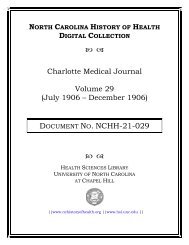
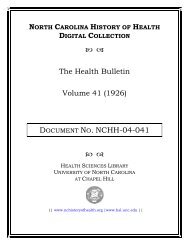
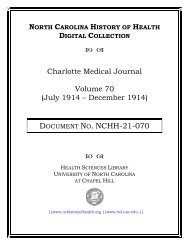
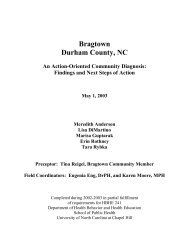
![Bulletin of the North Carolina Board of Health [serial] - University of ...](https://img.yumpu.com/48032016/1/153x260/bulletin-of-the-north-carolina-board-of-health-serial-university-of-.jpg?quality=85)
![The Health bulletin [serial] - University of North Carolina at Chapel Hill](https://img.yumpu.com/47603625/1/169x260/the-health-bulletin-serial-university-of-north-carolina-at-chapel-hill.jpg?quality=85)
![The Health bulletin [serial] - University of North Carolina at Chapel Hill](https://img.yumpu.com/43204263/1/172x260/the-health-bulletin-serial-university-of-north-carolina-at-chapel-hill.jpg?quality=85)
![The Health bulletin [serial] - University of North Carolina at Chapel Hill](https://img.yumpu.com/41981074/1/163x260/the-health-bulletin-serial-university-of-north-carolina-at-chapel-hill.jpg?quality=85)
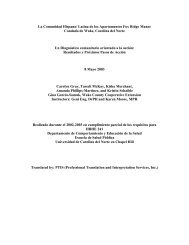
![The Health bulletin [serial] - University of North Carolina at Chapel Hill](https://img.yumpu.com/40912928/1/164x260/the-health-bulletin-serial-university-of-north-carolina-at-chapel-hill.jpg?quality=85)
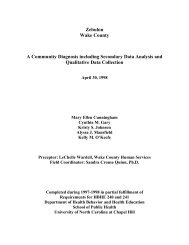
![The Health bulletin [serial] - University of North Carolina at Chapel Hill](https://img.yumpu.com/35643061/1/167x260/the-health-bulletin-serial-university-of-north-carolina-at-chapel-hill.jpg?quality=85)
![Biennial report of the North Carolina State Board of Health [serial]](https://img.yumpu.com/34024350/1/166x260/biennial-report-of-the-north-carolina-state-board-of-health-serial.jpg?quality=85)
